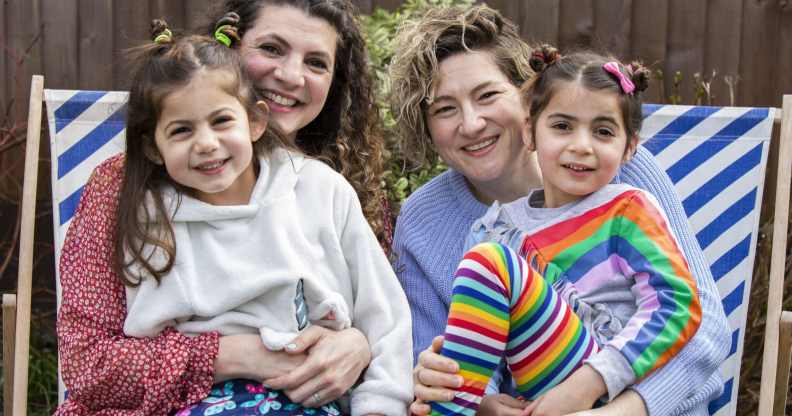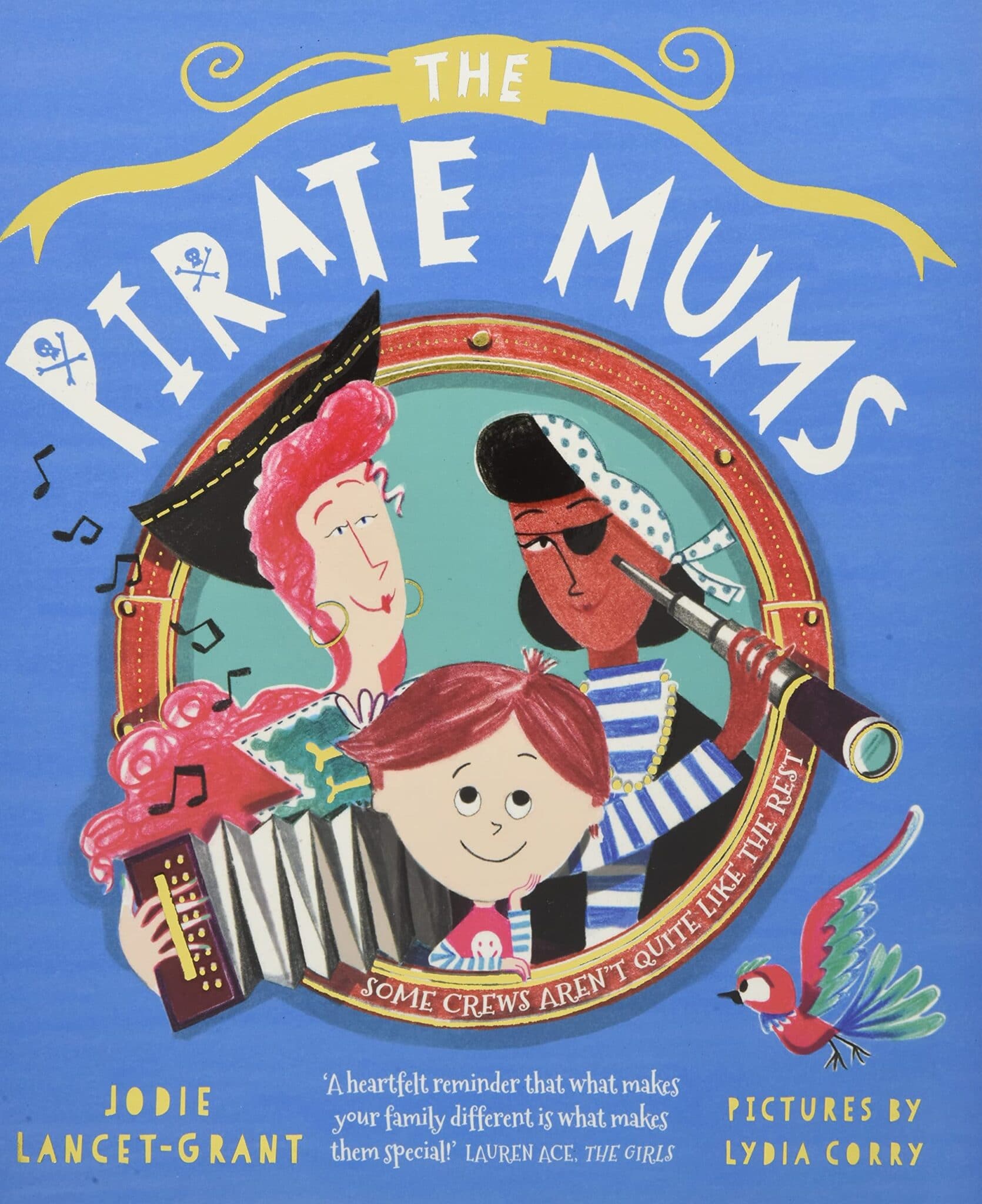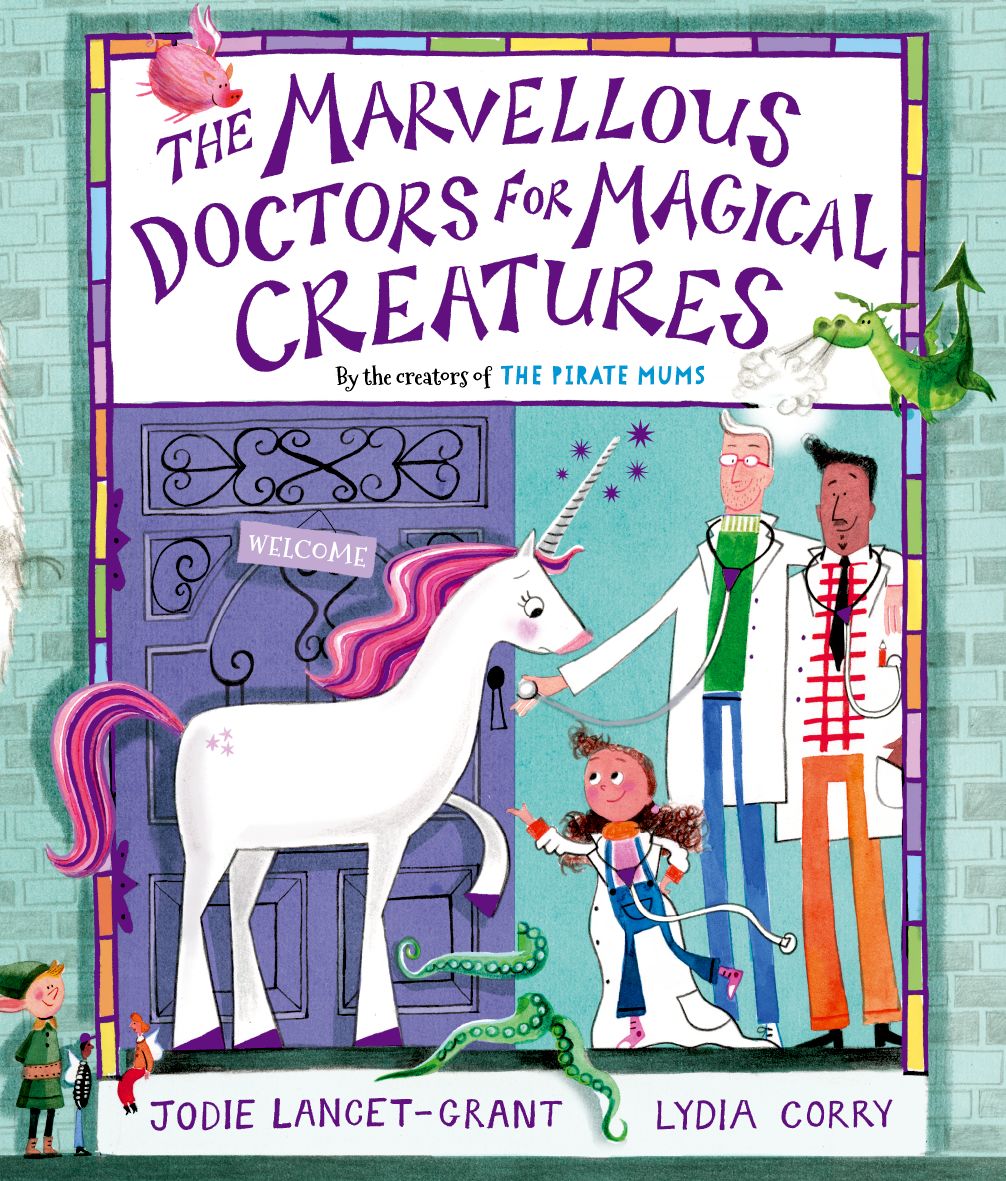Queer mum couldn’t find a kids’ book that represented her family – so she wrote her own

Jodie Lancet-Grant and her wife Sam with their daughters Delilah and Alexa. (Ellie Kurtz)
For LGBTQ+ parents, finding children’s books that represent your family in all its rainbow glory isn’t always an easy task.
For too long, the children’s books arena has been dominated by cis, white, middle-class and heterosexual characters. The result is that some kids are growing up without any positive representations of themselves and their families shining back at them.
A few years ago, Jodie Lancet-Grant realised that her seven-year-old daughters were starting to see their family as ‘different’ because they had two mums. She ordered some of the very few kids’ books out there that told stories of families like theirs, but was bitterly disappointed when they arrived.
“They were very old-fashioned in terms of their illustration,” she tells PinkNews. “One was a self-published pamphlet.”
Jodie works in book publishing, and knew that modern LGBTQ+ kids books could – and should – be “vibrant, funny, beautiful and cool”.
“I really got annoyed about it. I was moaning to my wife that evening about it, and she said, ‘Well you’re a writer – why don’t you write one?'” I thought, ‘OK, maybe I will’.”
Jodie Lancet-Grant wants children’s books where queerness is ‘incidental’
That was the initial impetus for Jodie to write The Pirate Mums, a picture book that shows kids that having a different family is actually what makes them special. While Jodie originally wrote the book to help kids of LGBTQ+ parents feel seen, she’s since come to realise just how important it can be for all families.

The Pirate Mums by Jodie Lancet-Grant.
“What’s actually become really clear is that it’s just as important for kids with straight parents or single parents to see different kinds of families in books,” Jodie explains.
“I think a lot of straight parents want to show these families to kids. They don’t want to have to sit down and say, ‘Some people have two mummies,’ a lot of people are very accepting and they want to show their children an accepting, tolerant world. Having story books like this that just feature two mums or two dads helps them do that, and it helps children see that it doesn’t really matter.”
I wanted to read something which just kind of happened to have a family with two mums or two dads.
It’s also important to Jodie that there are kids’ books out there that feature queer parents in a way that feels incidental – it shouldn’t necessarily be the focus of the story.
“There are some really lovely books specifically about how there are all different kinds of families and they are really important, but that’s actually not what I wanted to write and read to my girls,” she says. “I wanted to read something which just kind of happened to have a family with two mums or two dads, and that’s what I could find so little of where the family make up is incidental.”
It’s important that the presence of queer parents in children’s books is incidental because that helps kids learn that there’s nothing unusual about LGBTQ+ identity, Jodie says.
“What’s interesting is that I’ve done quite a lot of school visits. I did one for World Book Day and I spoke to 500 kids in a day and they asked loads of questions about the book, and not a single kid asked: ‘Why does Billy have two mums?’ They just didn’t notice that it was anything different.”
Most parents tend to read their kids old-fashioned books where queerness is invisible
Jodie is hopeful that books like hers can help make more children see that queerness is part of life. That’s why she was dismayed by research released by Oxford University Press earlier this year which found that two-thirds of parents tend to read books to their children that they enjoyed in their own childhood rather than newer titles.
That’s fine for some books, which still have cultural significance today – but others have aged badly, and they risk giving kids warped perceptions about what contemporary society looks like.
“In the last 30 years, this country has undergone a cultural revolution when it comes to societal acceptance of lots of different things, not just the LGBTQ+ community,” Jodie says. “Books reflect the time they’re written in, and there are plenty of stories that I was read when I was a kid that are perfectly fine in their values, but there are some that are actively no longer fine, especially the really old ones.”
Jodie came to realise just how badly some books have aged when she read a couple of classic children’s titles to her daughters during the first coronavirus lockdown.
“I found myself having to change the characters’ names because the girls in the book didn’t have any ideas. All they did was cook, clean and simper, and the boys had all the ideas and were clever and did the adventuring. I didn’t remember that from when I read them as a kid, but when I was reading them to my kids I was having to change the character names on the fly to make a different character say things because they were so sexist. That has really changed, so I think that we should reflect that.”
We were shown a really distorted version of life when we were growing up.
The trend of parents only reading their kids older books is also a problem because of Section 28, the law that prohibited the promotion of homosexuality in schools and local councils in England.
“There’s a whole generation of British people, many of whom are parents, where it was illegal to even mention anything queer when they were at school, so that was their impression of what life was like. But life was never like that, we were shown a really distorted version of life when we were growing up – so I think only having books that we discovered then is a bit of a problem partly because society has changed so much.”
Online trolling has emboldened Jodie to keep writing LGBTQ-inclusive kids’ books
While Jodie is proud of the work she’s done in incorporating queer parents into her children’s books, she’s also had to endure shocking homophobic trolling on social media and online because of it. She admits that she was “really surprised” by the extent of it.
“I suppose I’m living in a bit of a bubble working in the media, writing these books and being part of a supportive community,” Jodie says. But since the Oxford University Press research appeared in newspapers, she’s seen some horrific comments online about queer-inclusive children’s books, with some falling back on the harmful trope of linking queerness with paedophilia. Jodie was disturbed by the trolling, but it won’t deter her from doing what she does best.
“It was a really hard thing but I didn’t feel too upset, I felt more fired up. I didn’t feel in danger or anything – it just showed me how much these books are needed.”
Instead of bowing to pressure from bigots, Jodie finished work on her new book. The Marvellous Doctors for Magical Creatures follows in the footsteps of The Pirate Mums in that it also features a child with two same-gender parents.

The Marvellous Doctors for Magical Creatures is Jodie Lancet-Grant’s next book. (Provided)
“It’s being published just in time for Pride Month this year and it’s about a little girl called Ava her two dads who are doctors, but they’re doctors for magical creatures. In this book Ava wants to be a doctor when she grows up and so she helps her dads out in the surgery. A unicorn comes in and she has a tummy ache and no one knows what the reason for it is, so Ava goes to spend some time with her to try to work out what the problem is.”
The problem, of course, is anxiety – which is something that so many children are dealing with on a daily basis. Jodie wanted to give those kids a chance to feel seen.
“It’s a really lovely, heartwarming story about being true to yourself, and in this story, even more than The Pirate Mums, the fact that Ava has two dads is completely incidental.”
Jodie knows that books like hers can be important for children – she hopes books like hers mean the next generation of queer people will grow up knowing they can get married and have kids if that’s what they want to do.
“I know that lots of queer people don’t want to go down the ‘2.4 children’ family route – some people think being queer is about being different and that you can make your own relationship set ups,” Jodie says. “But if you do want to get married and have kids, you should be just as able to as anybody else. So I really want to show that that is an option – not to say that everybody has to do it – but to show that if that’s something that you want, there is a possibility of doing it.”
The Marvellous Doctors for Magical Creatures is published on 2 June by Oxford University Press.

